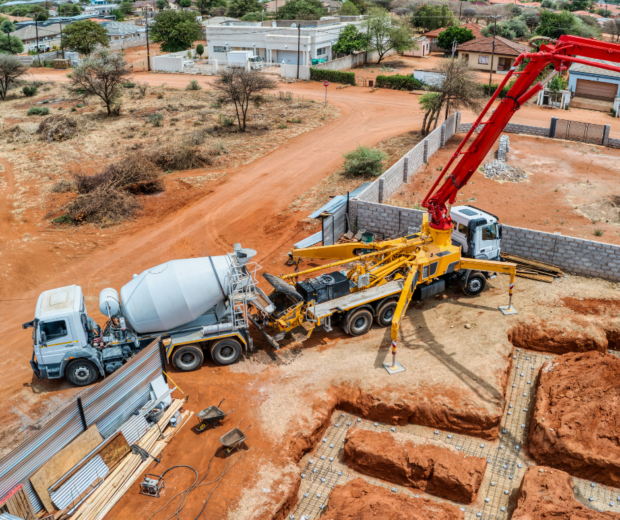Large construction projects rely heavily on efficiency and safety to ensure success. Concrete commercial contractors play an important role in controlling these factors, ensuring that projects are finished on schedule while meeting safety regulations. This article explores how these contractors improve efficiency and safety through advanced techniques, equipment, and best practices.
1. Modern Equipment and Technology
The use of modern equipment and technology is one key way concrete commercial contractors enhance efficiency. High-performance equipment, such as laser-guided screeding machines and automated concrete pumps, ensures precision while reducing the need for manual labor. While automatic pumps help spread concrete equally over large areas, laser-guided screeding delivers smooth, level surfaces and eliminates the need for labor-intensive changes.
Drones and 3D modeling software are examples of important technology. Contractors can monitor project progress and spot any problems with the use of drones, which give real-time site data. By anticipating obstacles, contractors can reduce mistakes and delays by using 3D modeling to envision the job in advance.
2. Prefabrication and Modular Construction
Prefabrication and modular construction are increasingly being utilized to increase speed and security. To minimize on-site dangers and weather-related delays, contractors might construct parts off-site in controlled surroundings. This technique is frequently used in large-scale projects when speed is essential, including office buildings and warehouses.
With prefabrication, the construction of modules in factories minimizes the chances of accidents. Once the prefabricated units arrive on-site, assembly is quick, further reducing the overall project timeline. This streamlined approach enhances both efficiency and safety by limiting exposure to on-site hazards.
3. Skilled Workforce and Training
Workers who have been properly trained are critical to the efficiency and safety of construction projects. Concrete commercial builders spend on the employees’ constant training to ensure they are up to date on the newest building techniques, safety standards, and equipment management. This eliminates mistakes and increases production since trained people can complete jobs more effectively.
Regular safety training also reduces the chance of accidents. Workers who understand and implement safety standards help to create a safer workplace, reducing the chance of harm and keeping projects on track.
4. Comprehensive Safety Protocols
Safety is a top consideration for concrete commercial contractors, particularly on large-scale projects. Contractors safeguard workers by implementing complete safety standards that include the use of personal protective equipment (PPE), safety signs, and equipment requirements.
In addition to safety officials monitoring the site, frequent safety seminars and drills ensure that personnel remain alert. Building Information Modeling (BIM) also contributes to increased safety by allowing contractors to plan every part of the project in detail. This helps to detect and reduce possible dangers before the building begins.
5. Efficient Project Management
Concrete commercial contractors improve efficiency through effective project management. Large projects are complicated, necessitating meticulous coordination of several activities and resources. Contractors can use project management software to track progress, distribute resources, and make schedule adjustments as needed. These solutions give real-time updates, enabling managers to avoid bottlenecks and keep projects on pace.
Lean construction practices are often employed to eliminate waste and optimize the use of materials and labor. By focusing on value maximization and waste reduction, contractors ensure projects stay within budget and on schedule.
6. Sustainability and Environmental Considerations
Increased efficiency and safety are also influenced by sustainability. In order to lessen the project’s negative environmental effects, concrete commercial contractors frequently use eco-friendly techniques including recycling materials and energy-saving equipment. Additionally, because they are long-lasting and require less maintenance, sustainable materials cut down on future repair and downtime requirements.
Moreover, safe practices increase security. The use of eco-friendly, non-toxic products, for example, lowers worker health hazards, and energy-efficient equipment both lessens environmental impact and improves operational effectiveness.
Last thoughts
Concrete commercial contractors play an important role in increasing productivity and safety in major building projects. They guarantee that projects are finished on schedule, under budget, and safely by utilizing contemporary technology, prefabrication, trained labor, rigorous safety regulations, efficient project management, and sustainable practices.
For top-tier services in this field, JAMISON CONSTRUCTION stands out for its commitment to innovation and reliability. Their expertise in delivering projects on schedule while maintaining high safety standards makes them an excellent choice for any large construction project.

